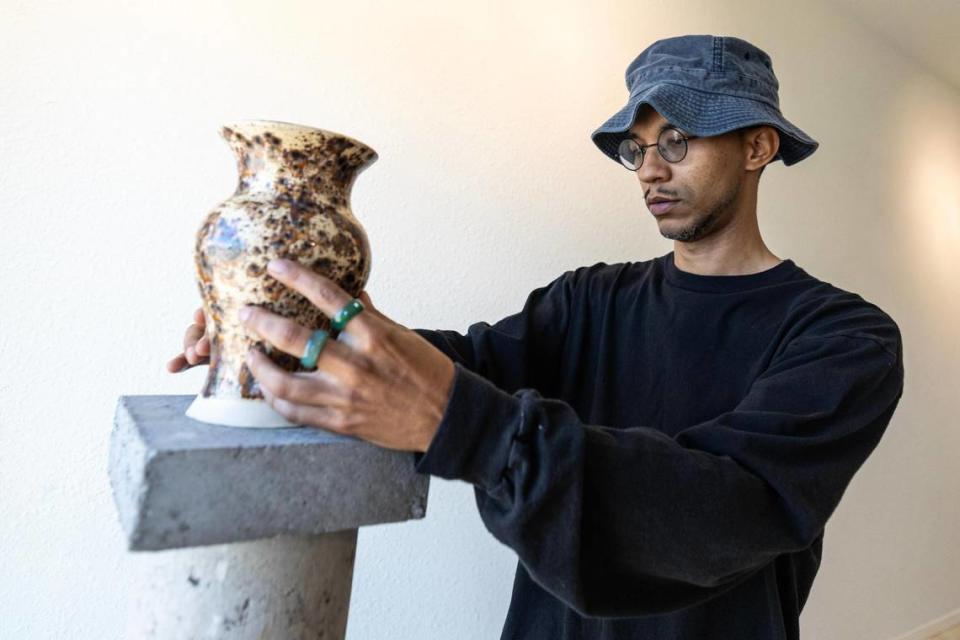Here’s a new gallery for Black and brown artists in Fort Worth, minus commercialization
- Oops!Something went wrong.Please try again later.
A new free art space will open on the east side of Fort Worth to empower underrepresented artists and share their work with the community.
The Tubman Gallery, in partnership with CommUnity Frontline, will open its inaugural exhibition at 6 p.m. April 5 at 6613 E. Lancaster Ave. The exhibition is titled “I ain’t never belonged to just one person.” The gallery is in the Handley neighborhood, which was once a booming railroad hub.
The Tubman Gallery gets its name from abolitionist Harriet Tubman. She was famous for being a conductor of the Underground Railroad, helping fugitive slaves escape from the South through a network of people and routes to freedom in the North.
Matt Nelson, co-founder and director of the Tubman Gallery, grew up in east Fort Worth and is a musician, designer, and visual artist. He promotes the idea of freedom for people to express themselves through their art and to find a community that will embrace them without restrictions related to money.
“It’s giving artists a chance to say something that they can’t say somewhere else,” Nelson said.
The Tubman Gallery runs on a noncommercial model, which means it doesn’t sell art or charge admission. Exhibitions and programming are partially paid for through charitable contributions from CommUnity Frontline. Donations from the public are also welcome. CommUnity Frontline is a nonprofit organization that focuses on racial justice issues on the east side of Fort Worth.
Nelson says the Tubman Gallery will focus on underexposed and thought provoking works from women, Black and brown artists.

The theme of the gallery, “I ain’t never belonged to just one person,” centers on the idea that the gallery and its art are meant for the community to enjoy freely and leave the audience with the question, “Who do you belong to?” according to Nelson.
It will feature works from Amandla Baraka, Remember Charles and Phylandra McFaddin. It will also feature a presentation of the film “The Chrononaut” by Jordan Riggs and a musical presentation by Leo Vaughns Jr., a pastor at St. Mark Cumberland Presbyterian Church.
Andrèa Price will also present her work at the Tubman Gallery. A multimedia artist living in San Diego, Price’s work focuses on portraits of African American women and abstract works of nature.
Price is excited about the Tubman Gallery because of its different approach to displaying art. Museums can be intimidating and out of reach for many, she said, but the Tubman Gallery will help make art spaces more inclusive for artists and appreciators alike.
“Art is for everyone, and art should not be hoarded and kept away from everyone,” Price said. “I think that everyone is deserving and worthy of having the opportunity to experience art in various mediums and from many different types of artists.”
Dante Williams is a co-founder of the Tubman Gallery and owns the building, Blank Space Fort Worth, where the gallery will be headquartered.
He bought the building for people of color to show their contributions to the city, whether that is through establishing a business, the arts, healthcare, or education. Since it opened in December, there have been over 50 events held at Blank Space.
Williams sees the Tubman Gallery adding to the growth and revitalization to the east side of Fort Worth where the wedding district and other businesses are already situated.
“For a community, especially Black and brown communities, where youth and people oftentimes find it difficult to see things actually happen for them, they can see it happening here,” Williams said.
Quinton Phillips is a co-founder of CommUnity Frontline who says the east side has been historically neglected. The community wanted a creative space to showcase Black and brown talent, he said, leading his organization to partner with the Tubman Gallery.
“The more investment we see in the east side, the more people that we draw eyes over to this side of town, the more economic stimulus that we can put by having businesses here that people will be able to utilize,” Phillips said. “It really does a world of good for the infrastructure, it does a good for beautification, and really uplifts an entire sector of the city and an entire community.”

